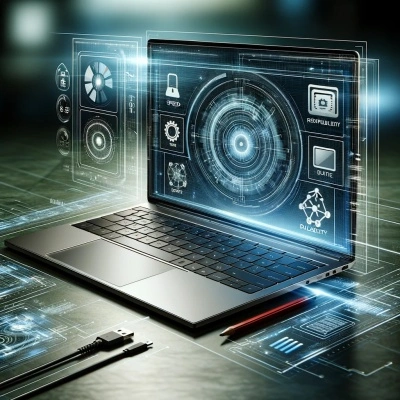The Art of Computer Revival: Mastering the Techniques to Fix Your Slow Machine
Experiencing a sluggish computer can be incredibly frustrating, particularly when deadlines loom or tasks demand swift completion. Fortunately, a range of straightforward solutions exists to restore your system’s vitality. This article will guide you through various practical steps to rejuvenate your machine, enhancing its performance and efficiency. Whether it’s a fleeting hiccup or a persistent slowdown, these tips are designed to address the root causes and breathe new life into your computing experience.
I. Understanding the Causes of a Slow Computer
A. Hardware Limitations
A computer’s speed can be significantly hindered by outdated or insufficient hardware. Aging processors, limited RAM (Random Access Memory), and hard drives nearing their capacity often struggle to meet the demands of modern, resource-intensive applications and operating systems. Regular usage and wear can also degrade hardware components over time, leading to diminished performance.
B. Software Overload
Software-related issues can also impact a computer’s efficiency. These include an excess of background applications, bloated software consuming extensive system resources, and insufficient storage space. Additionally, outdated drivers or operating systems lacking the latest updates can contribute to a computer’s sluggishness.
C. Malware and Viruses
Malware and viruses are notorious for sapping computer performance. These malicious programs can run unnoticed in the background, using up system resources, tracking your activities, and even damaging files. Regular system checks and a robust security protocol are vital to prevent these threats from impacting computer speed and security.
II. Initial Troubleshooting Steps
A. Restarting Your Computer
Often, the simplest solution can be the most effective. Restarting your computer can clear the system’s memory and stop any lingering processes that may be consuming resources unnecessarily. This basic step can resolve temporary glitches and significantly improve performance.
B. Checking for Updates
Software and operating system updates often contain critical improvements and bug fixes that can enhance your computer’s performance. Regularly checking for and installing these updates ensures that your system is not only running optimally but is also protected against the latest security threats.
C. Clearing Temporary Files
Over time, computers accumulate temporary files, which can take up valuable space and slow down system performance. Tools like Disk Cleanup can be used to remove these files, freeing up space and allowing the system to run more smoothly.
III. Optimizing Computer Performance
A. Upgrading Hardware
When hardware limitations are the root cause of a slow computer, upgrading components like RAM or switching from a hard drive to an SSD (Solid State Drive) can provide a noticeable boost in performance. These upgrades can extend the life of your machine and are often more cost-effective than purchasing a new computer.
B. Managing Startup Programs
Many programs are configured to start automatically when the computer boots, which can significantly extend startup times and reduce overall performance. By accessing the Task Manager or System Preferences, users can manage these startup programs, disabling non-essential applications to improve boot times and system efficiency.
C. Disk Cleanup and Defragmentation
Regularly performing disk cleanup removes unnecessary files, while disk defragmentation reorganizes fragmented data, making it easier for your computer to access. These maintenance tasks are especially important for computers with traditional hard drives and can substantially improve system performance.
IV. Advanced Solutions
A. Adjusting Visual Effects for Performance
Visual effects and animations can consume significant system resources. Adjusting these settings to prioritize performance over aesthetics can free up resources and improve speed, especially on older systems or machines with limited graphics capabilities.
B. Modifying Power Settings
Power settings can impact performance, particularly on laptops. Adjusting these settings to favor performance over energy savings can enhance system speed, though it may reduce portable devices’ battery life.
C. Resetting or Reinstalling the Operating System
In cases where performance issues are deep-rooted, resetting or reinstalling the operating system might be necessary. This process can remove corrupt files, eliminate bloatware, and restore the system to a clean state, often resulting in significant improvements in speed and functionality.
V. Maintaining Your Computer’s Health
A. Regular Software Updates
Keeping software up to date is not just important for security; it also ensures that you have the latest performance enhancements and bug fixes. Regular updates contribute to a smoother, more efficient computing experience.
B. Antivirus and Anti-Malware Protection
A robust antivirus and anti-malware suite is essential for protecting your computer from threats that can compromise performance and security. Regular scans and real-time protection ensure that your system remains free from malicious software.
C. Regular Hardware Check-ups
Just like any other machine, a computer benefits from regular check-ups and maintenance. Cleaning dust from internal components, ensuring adequate ventilation, and checking the health of your hard drive can prevent performance issues related to overheating or hardware failure.
Understanding the multiple facets that can impact your computer’s performance, from hardware to software, and implementing a consistent maintenance routine can transform your computing experience, turning a sluggish system into a reliable and efficient machine.
VI. FAQs
Q: Why does my computer slow down over time?
A: Computers can slow down for a variety of reasons, including hardware aging, software bloat, the accumulation of temporary files, and the presence of malware or viruses. Regular maintenance and updates can help mitigate these issues.
Q: Can upgrading RAM improve my computer’s performance?
A: Yes, upgrading RAM can significantly improve performance, especially if you run multiple applications simultaneously or use memory-intensive programs.
Q: How often should I perform disk cleanup and defragmentation?
A: It’s recommended to perform disk cleanup and defragmentation every few months to ensure your computer runs efficiently, though the frequency can vary based on your usage.
Q: Are antivirus programs necessary for maintaining computer speed?
A: Yes, antivirus programs are crucial as they protect your computer from malware and viruses that can significantly slow down your system.
Q: What are the signs that I might need to replace my computer instead of fixing it?
A: Consider replacing your computer if it’s several years old, repairs are costly, it struggles to run basic tasks, or it’s incompatible with the latest hardware and software updates.
Q: How can adjusting visual effects improve computer performance?
A: Reducing or turning off visual effects frees up system resources, improving speed, especially on older or less powerful computers.
Q: Is it better to put my computer to sleep or shut it down?
A: Sleeping is ideal for short breaks as it provides a quick resume, while shutting down is better for longer periods as it clears RAM and stops all processes, potentially improving performance upon restart.
VII. Conclusion
From simple troubleshooting steps like restarting your computer and clearing temporary files to more advanced solutions such as upgrading hardware and adjusting settings, the paths to a faster and more efficient computer are manifold.
Regular maintenance, including software updates and hardware check-ups, is key to sustaining peak performance and extending the lifespan of your device. By following the guidelines outlined in this article, users can transform a sluggish machine into a productive and efficient asset.
VIII. Suggested Readings
Before diving into these books, it’s crucial to recognize the wealth of knowledge they offer. From understanding the basics of computer hardware to mastering software optimization, each book provides valuable insights for improving your computer’s performance.
- “Upgrading and Repairing PCs” by Scott Mueller – A comprehensive guide to hardware maintenance, troubleshooting, and upgrading.
- “Windows 10 Inside Out” by Ed Bott, Carl Siechert, and Craig Stinson – An in-depth exploration of Windows 10, offering tips for optimization and troubleshooting.
- “Troubleshooting and Maintaining Your PC All-in-One For Dummies” by Dan Gookin – A user-friendly guide to maintaining and troubleshooting PC issues, ideal for beginners and seasoned users alike.
- “Speed It Up! A Non-Technical Guide for Speeding Up Slow Computers” by Michael Miller – Practical advice for enhancing the performance of your computer, focusing on non-technical users.
- “PC Hacks: 100 Industrial-Strength Tips & Tools” by Jim Aspinwall – A collection of expert tips and tools for getting the most out of your PC, covering both hardware and software aspects.
Incorporating the insights from these books can deepen your understanding of your computer’s functionality and further empower you to optimize its performance. With the right knowledge and tools, transforming your computer from sluggish to swift is an achievable feat.






